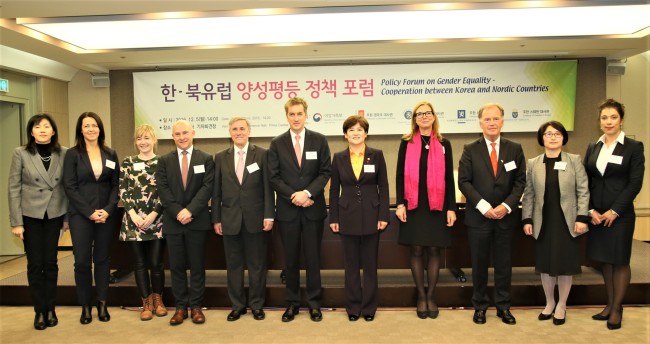The embassies of Denmark, Norway, Sweden and Finland hosted a forum last week to shine light on policies and experiences related to gender equality.
The event, Policy Forum on Gender Equality: Cooperation Between Korea and Nordic Countries, was held at the Korea Press Center in Seoul on Dec. 5 and co-organized by Korea’s Ministry of Gender Equality and Family.
Delving into policies aimed at utilizing female talents and breaking the glass ceiling, the seminar featured presentations by Pernille Ravn Jakobsen, a researcher at the Center for Innovative Medical Technology at the University of Southern Denmark; Laila Bokhari, state secretary of the Norwegian Ministry of Foreign Affairs; Patrick Johansson, CEO of Ericsson-LG in Sweden; and Linda Liukas, the Finnish author of children’s book “Hello Ruby.”
 |
Participants comprised of Nordic ambassadors, Korean minister of gender equality and family and policy experts, entrepreneurs and writers pose at the Policy Forum on Gender Equality: Cooperation Between Korea and Nordic Countries at the Korea Press Center in Seoul on Dec. 5 (Danish Embassy) |
Noting that Korea suffers from a low birthrate and aging population, Kang Eun-hee, Korean minister of gender equality and family, stressed that “the revitalization of global economy is only possible with the full utilization of female talents.”
“As confirmed in many advanced countries, high female employment leads to higher economic growth and fertility rate,” the minister emphasized.
As a result of the Korean government’s efforts, female employment rates rose to record highs last year, particularly in the public sector, Kang highlighted.
“When I was growing up in Norway in the late 1970s, the ‘gender revolution’ began to demand women’s rightful place in politics, society and economy,” Bokhari said.
She pointed to key aspects of Norway’s welfare system -- including extensive parental leave, public day care centers, flexible work hours and the right to paid leave for taking care of sick children -- as instrumental to achieving a gender-equal society.
“Our work has taught us that it is not enough to focus on women’s rights to improve gender equality,” the state secretary claimed. “We must also strengthen the role of fathers for the benefit of children and parents themselves.”
Creating a quota for paternal leave was crucial, according to Bokhari, as it ensured that fathers participated in early childcare.
With the United Nations Sustainable Development Goals’ fifth objective being the achievement of gender equality and female empowerment, improvements have been made in health care and education, she added, although gaps still exist in economic participation and political empowerment.
“The SDGs, together with the Beijing Platform for Action, provide a historic opportunity to achieve gender equality,” the bureaucrat argued. “We must translate these commitments into action through policies, political leadership and funding.”
By Joel Lee (
joel@heraldcorp.com)








![[Today’s K-pop] Blackpink’s Jennie, Lisa invited to Coachella as solo acts](http://res.heraldm.com/phpwas/restmb_idxmake.php?idx=644&simg=/content/image/2024/11/21/20241121050099_0.jpg)